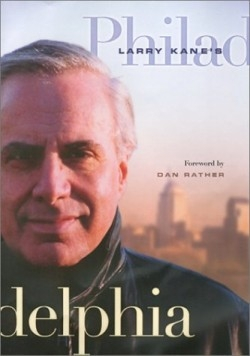Larry Kane's Philadelphia
Dan Rather calls Larry Kane, the only lead anchor in America to work for all three major markets: ABC, NBC and CBS, “the dean of Philadelphia newsmen.” During his thirty-four-year career he has covered almost every major event, earning the respect of local politicians, presidents, entertainers, and everyday citizens along the way. Larry Kane finds nothing more satisfying “than being the first [with a story], except being accurate.” Dan Rather makes a good case. Kane’s love affair with Philadelphia resonates throughout his book. All readers, regardless of where they call home, will relish the anecdotes about Philly’s praised and notorious leaders and the events that made them legends. Good broadcast journalism is good broadcast journalism.
Philadelphia, unlike other major cities, is more a conglomeration of diverse neighborhoods with sometime edgy racial relations, where blacks and whites manage to live peacefully. This was much less so in Philadelphia as it was for America in 1966, when Kane came to this city from Miami. By 1968 he was covering many of the unforgettable events of that tumultuous year. Kane was present at the arrest of James Earl Ray, Martin Luther King’s assassin, at Heathrow Airport in England. On the same overseas assignment he was tear-gassed by riot troops in France for trying to prevent them from raping female protestors during the student revolt at the Sorbonne. Kane returned to Philadelphia in time to cover the police riot at the Democratic Convention in Chicago.
His memoir teems with stories about such politicos as former mayor James Tate, who reigned over a Democratic machine that arguably rivaled Daley’s in Chicago, and events of national significance, including the fatal Move confrontation of 1985, where Mayor Wilson Goode became the first national leader to intentionally bomb one of his own neighborhoods; the Three Mile Island nuclear meltdown of 1979; and the sixties race riot in Wilmington, Delaware, that paralyzed the city for several months.
Not every event was so harrowing. Former Beatle John Lennon once stepped in to do the weather forecast on Kane’s show. The “fab four” became friends with Kane when he accompanied them on their summer tours of 1964?66, before he came to Philadelphia. The most revealing
stories are about former mayor Frank Rizzo, the onetime rough and tumble police commissioner who dominated Philadelphia politics throughout the 1970s and 1980s. Rizzo, to Kane, was the most authentic politician of his time. This colorful and controversial man was the first mayor to represent those city dwellers that couldn’t or wouldn’t move to the suburbs. Rizzo, according to Kane, had a soft spot for those down on their luck despite his menacing manner.
Newscasts did not always run with seamless efficiency. Desi Arnaz, the popular former real life and television husband of Lucille Ball, died after a long illness while Kane was on the air. Producer Paul Gluck broke the news to Kane’s co-anchor, Alan Frio, by whispering “Lucee, I’m dead!” Frio was so convulsed that he crawled off the set, leaving Kane to finish the show while struggling not to laugh.
Larry Kane, after so many years, shows no sign of slowing down or losing his enthusiasm for the news. The reader of these memoirs will be treated to a real taste—good and bad—of Philadelphia by a man who has become a local institution in his own right.
Reviewed by
Karl Helicher
Disclosure: This article is not an endorsement, but a review. The publisher of this book provided free copies of the book to have their book reviewed by a professional reviewer. No fee was paid by the publisher for this review. Foreword Reviews only recommends books that we love. Foreword Magazine, Inc. is disclosing this in accordance with the Federal Trade Commission’s 16 CFR, Part 255.

